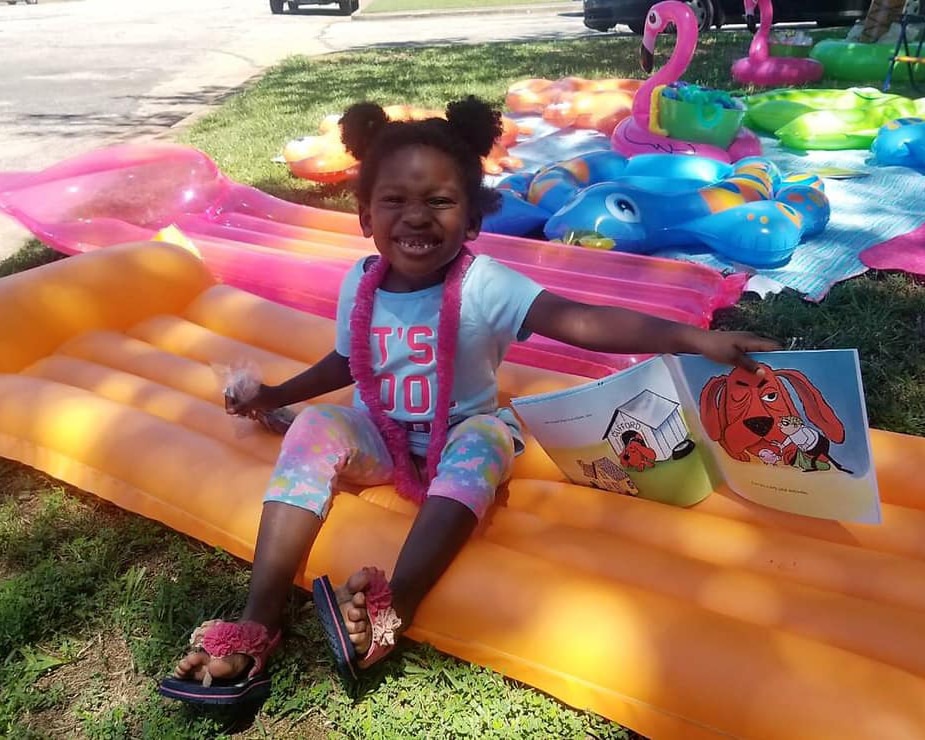Get Meriwether Reading Launches First Summer Read & Feed Program
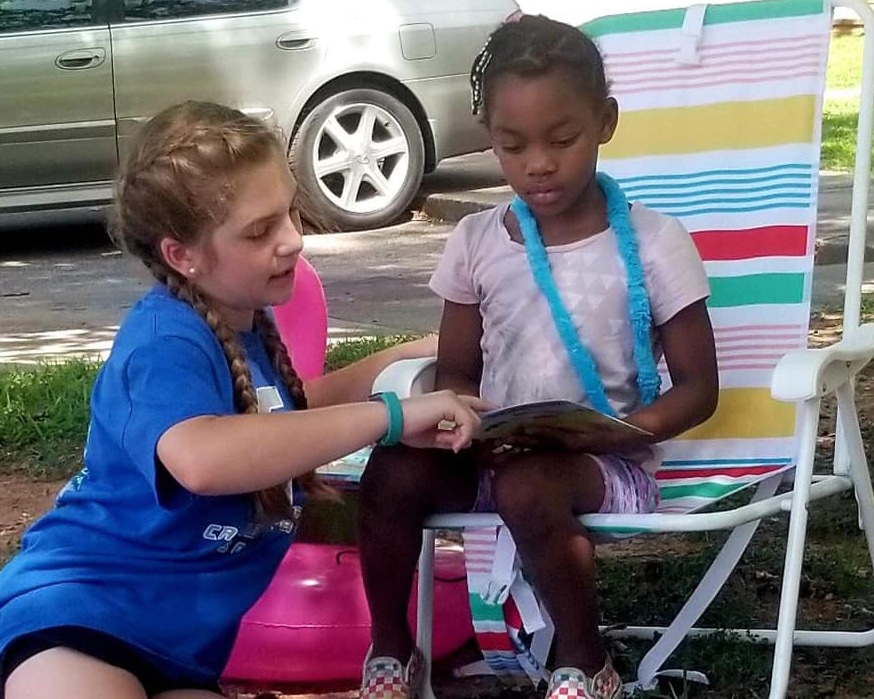
By Rhonda Fuller
Meriwether County Family Connection Executive Director
If you were out and about in Meriwether County this summer, chances are you spotted feeding vans cruising through neighborhoods to deliver books and meals to children at risk and below reading level. In tow, more than 30 volunteers lugging chairs, blankets, towels, and inflatable palm trees and flamingoes to create a beachy theme as kids listened to stories and enjoyed nutritious meals.
This was all part of the county’s first Summer Read & Feed Program, which Get Meriwether Reading and the Meriwether County School System’s nutrition program launched this year. Our volunteers—elected officials, community leaders, current and retired teachers, members of the faith-based community, and community partners—read at 20 feeding sites and reached more than 200 children.
Thanks to generous donations and grants, we were able to provide a free book for each of those children to keep. MCFC also worked in partnership with the Summer of Champions Summer Camp and the local library to have a FOAM Day with fun stations for kids.
At the end of the summer, we hosted a luncheon to thank our volunteers. They shared so many endearing stories of reading to the children. One volunteer even said the children wanted to read to them by the end of the program.
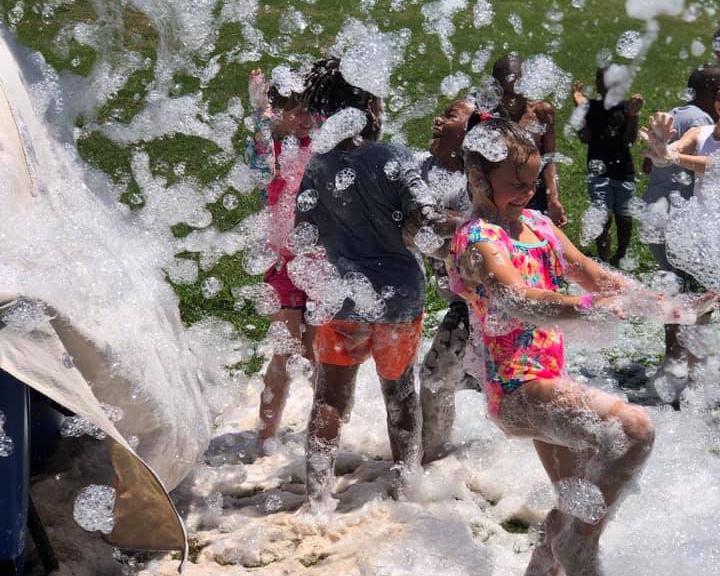
Applying A Framework for Action
Before Meriwether became a Get Georgia Reading Campaign community in December 2018, the Meriwether County Family Connection (MCFC) Board organized meetings with the Meriwether County School System district staff and superintendent. Using the Campaign’s Community Action Workbook as a guide, we invited community leaders to a stakeholder meeting that consisted of 40 collaborative partners. We established the Get Meriwether Reading Leadership Team in January 2019, co-chaired by Meriwether Chamber of Commerce (MCCoC) Executive Director Carolyn McKinley and me, and completed our two-year work plan with action items in each of Get Georgia Reading’s four Campaign pillars.
After MCFC added Get Meriwether Reading/Early Literacy to our FY20 Annual Work Plan, we realized we were already working with some of the same population in our existing Low Birthweight Prevention work, and collaborating with major key stakeholders. We also had a previous strategy team called Project TLC (Transforming Lives in our Community) that was focused on a variety of mentoring activities in the community. We decided to combine the work and roll it into our Get Meriwether Reading work plan.
Applying the Get Georgia Reading framework allowed us to more strategically evaluate the literacy and early childhood issues and develop a clearer pathway forward. Our top priorities are building a strong awareness campaign, developing strategies that give us opportunities to reach and engage the birth through age 3 population and their parents, and ensuring that all our children are ready for pre-K.
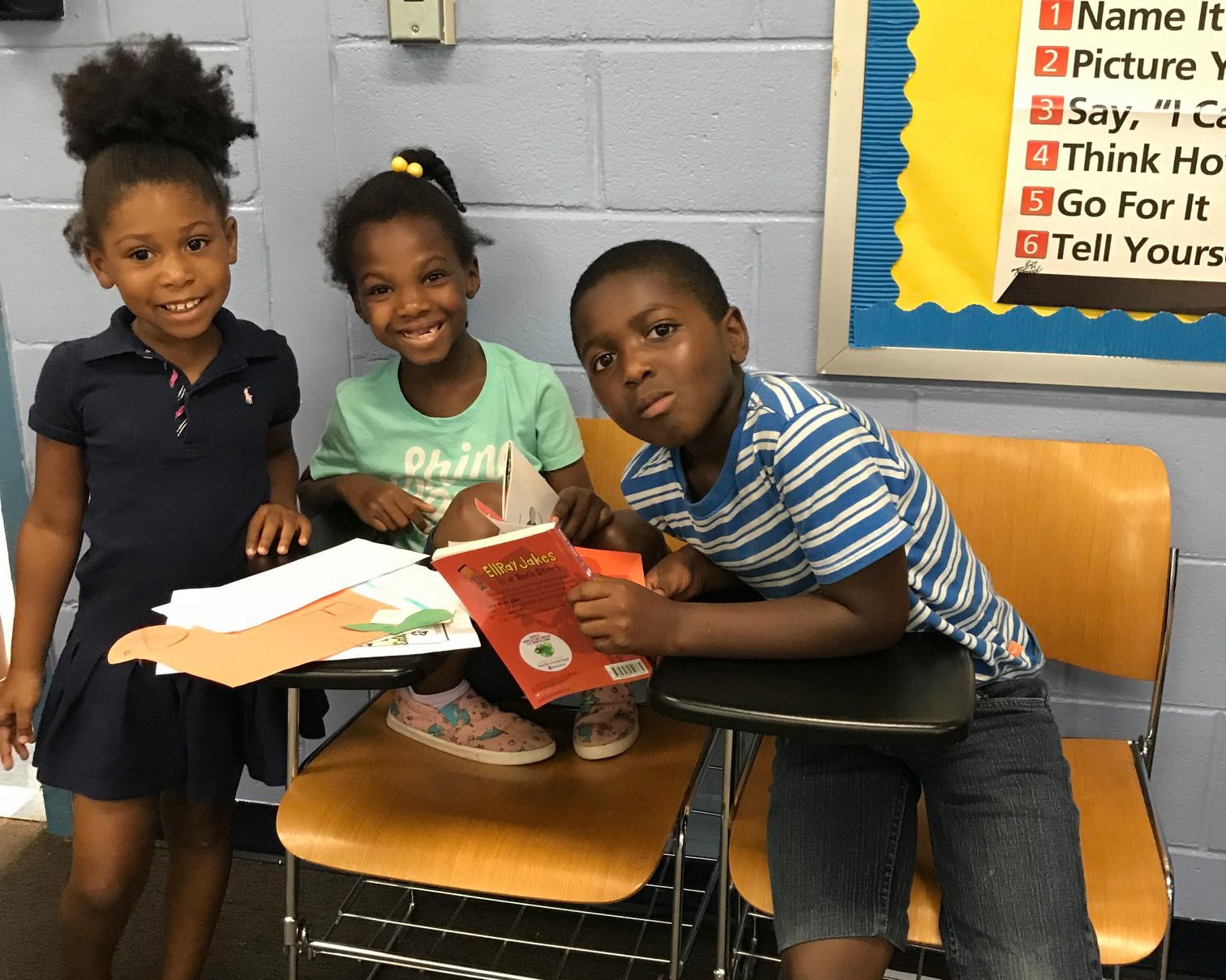
The Power of Partnerships
Meriwether County School System (MCSS) Superintendent Robert Griffin has helped rally the school system and school board to support Get Meriwether Reading. Our relationship with the director of School Nutrition has also been instrumental in expanding the number of summer feeding sites and incorporating the reading component.
Carolyn at MCCoC saw the significance of this initiative through a workforce development lens, realizing raising healthy, literate children who grow up career ready starts in the womb. She has helped the business community see the importance of our work and how they can be part of it.
We secured $1,000 seed money and later an additional $11,000 grant from Georgia Power to launch our campaign. Relationships like these have helped us establish an awareness campaign—the first action item in our work plan.
Meanwhile, MCFC’s collaborative partnerships, including Georgia Department of Public Health’s District 4 Public Health and our work in their Community Health Improvement Plan (CHIP) Accreditation process also have supported our efforts.
Relationships we’ve established and continue to maintain helped us recruit a pool of Summer Read & Feed program volunteers throughout our county and surrounding counties. We first convened our volunteers to review a reading protocol that would allow for interactive engagement with the children, and we let them choose from a large collection of books. It was gratifying for the volunteers to be able to hand kids books to keep, thanks to Georgia Power, and to encourage them to read at home to siblings and parents.
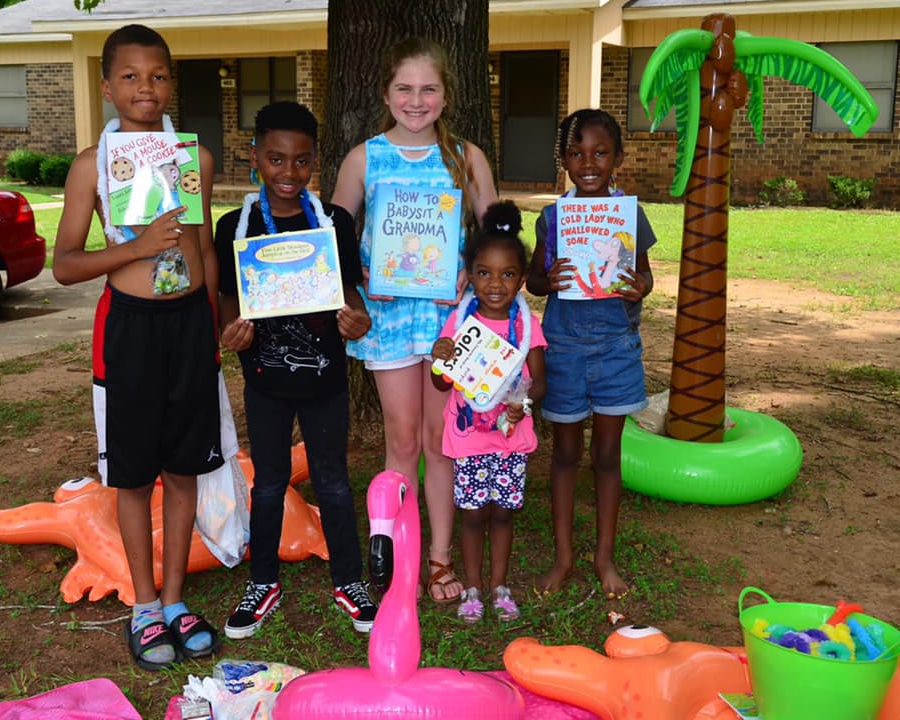
Granting Results
Several grants have allowed us to move forward with different aspects of our work plan.
- With help from Dr. Griffin and in partnership with MCSS, we were awarded a $74,800 Innovation Grant from the Governor’s Office of Student Achievement. MCFC also was awarded $8,000 through the Kaiser Permanente Low Birthweight Prevention Grant. This funding allowed MCFC to hire early literacy coordinator Angie Shirah and low birthweight specialist Tangela Fuller, who will work together on action items.
- MCFC and MCSS received the 21st Century After-School Grant in June, so we will work with our three elementary schools to provide parent engagement classes that promote reading.
- A $1,000 CSX Community Service Grant allowed MCFC and MCCoC to provide reading and back-to-school materials to children entering pre-K at our Champions Back to School Bash in August.
- MCFC and MCCoC received a $2,000 Rotary grant that will provide Leapfrog reading materials to the most at-risk children birth through age 3 that are identified through partnerships with WIC, Division of Family and Children Services, and our Low Birthweight Prevention outreach program.
- MCSS, MCFC, and MCCoC were awarded a $3,085 grant from Southern Rivers Energy to be used for arts and STEM programming for pre-K students that promotes early literacy and Get Meriwether Reading, along with a Georgia Council for the Arts Vibrant Communities grant to promote reading and arts in schools. This multi-layered initiative included distributing the book Peter Pan to all second graders; enlisting volunteers to read the book to the children and lead conversations designed to stimulate creative thinking and verbal skills; and taking the children to a live performance of “Peter Pan,” followed by experiential learning activities back in the classroom.
Lessons Learned
We learned a lot from our first Summer Read & Feed program. We know to consult with the school system nutrition program first and work closely with the food delivery drivers, and we know there are empty stops where summer camps are taking place. Next year, we will deliver a letter to parents before the program starts to encourage adults to come and interact with their children.
To be successful, you need a pool of reliable volunteers. Jennifer Smith coordinated this program, communicating weekly with the nutrition team, and she reminded volunteers where they needed to be and when. Developing a comprehensive spreadsheet and hosting that initial volunteer meeting both proved to be solid avenues for the project.
Conducting Google surveys for volunteers helped us capture valuable data including how many children and parents participated, along with their level of engagement. Volunteers were encouraged to share pictures on social media to grow the program’s awareness and stimulate more volunteer interest.
In all my years as a Georgia Family Connection partner since 2004 and as executive director since 2017, this is the first initiative I’ve seen the entire county and community leaders want to be part of, and the first time I’ve seen MCFC apply for grants to support such a critical program and be awarded this many at one time. This work depends on having strong community relationships and being able to instill a sense of urgency. We’ve been blessed with a great school system, leadership team, volunteers, and a community that supports the work wholeheartedly.

